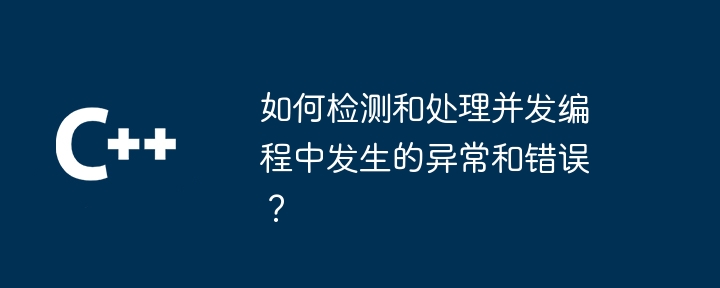Home >Backend Development >C++ >How to detect and handle exceptions and errors that occur in concurrent programming?
How to detect and handle exceptions and errors that occur in concurrent programming?
- WBOYWBOYWBOYWBOYWBOYWBOYWBOYWBOYWBOYWBOYWBOYWBOYWBOriginal
- 2024-05-08 10:27:011199browse
Exceptions and errors in concurrent programming can cause application failures and can be detected through code review, unit testing, and runtime monitoring. Processing methods include exception handling, locking mechanisms, resource management and recovery operations. In practical cases, concurrent access to shared counters requires appropriate use of synchronized blocks to prevent race conditions.

How to detect and handle exceptions and errors in concurrent programming
In concurrent programming, interactions between threads may Causes various exceptions and errors. Detecting and handling these issues is critical to ensure the robustness and correctness of your application.
Exception and error types
Common exceptions and errors in concurrent programming include:
- Deadlock: Occurs when threads wait for each other to obtain resources, causing the application to hang.
- Race condition: Occurs when multiple threads access shared data at the same time, possibly resulting in data corruption.
- Resource exhaustion: Occurs when an application requests more resources than are available on the system, such as memory or threads.
- Invalid operation: Occurs when a thread attempts to perform an invalid operation, such as releasing a lock that is not held.
Detecting exceptions and errors
There are many ways to detect concurrency exceptions and errors:
- Code review: Check the code carefully to identify potential concurrency issues.
- Unit testing: Use concurrent unit testing to simulate the interaction between threads.
- Runtime monitoring: Use tools (such as thread analyzers) to monitor thread activity and identify abnormal behavior.
Handling Exceptions and Errors
Once exceptions and errors are detected, there are several ways to handle them:
-
Exception handling: Use the
try-catchblock to catch exceptions and take appropriate action, such as logging the error or notifying the user. - Lock mechanism: Use locks (such as mutex locks, read-write locks) to control access to shared data and prevent race conditions.
- Resource Management: Use appropriate technologies (such as object pools) to manage system resources and prevent resource exhaustion.
- Recovery operations: In some cases, recovery operations can be implemented to recover from exceptions or errors.
Practical Case
Consider the following example of a shared counter:
public class SharedCounter {
private int count;
public synchronized void increment() {
count++;
}
public synchronized void decrement() {
count--;
}
public int getCount() {
return count;
}
}In this example, we use synchronized Method to prevent concurrent access to count. However, if synchronized blocks are not used correctly, race conditions may occur.
Error Example:
public void run() {
SharedCounter counter = new SharedCounter();
counter.increment();
if (counter.getCount() > 1) {
counter.decrement();
}
}In this error example, a race condition may occur due to the following reasons:
- If another thread
increment()is being called before checkingcounter.getCount(), the value ofcounter.getCount()may be incorrect. - If another thread is calling
decrement()afterincrement(),counter.getCount()may return the wrong one again value.
Corrected example:
public void run() {
SharedCounter counter = new SharedCounter();
synchronized (counter) {
counter.increment();
if (counter.getCount() > 1) {
counter.decrement();
}
}
}In the corrected example, we use the synchronized block to check counter.getCount() Wrapped with decrement() that may be called subsequently. This ensures that only one thread in the critical section can perform these operations, preventing race conditions.
The above is the detailed content of How to detect and handle exceptions and errors that occur in concurrent programming?. For more information, please follow other related articles on the PHP Chinese website!

